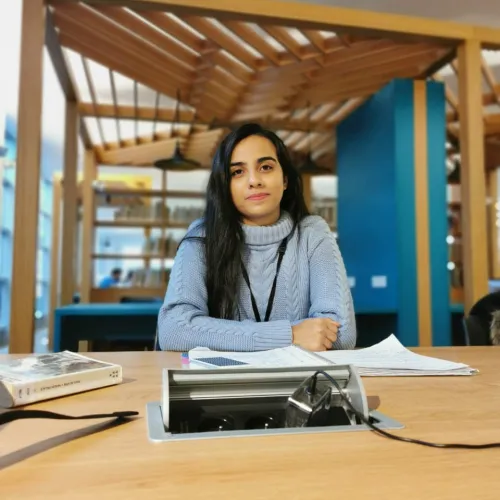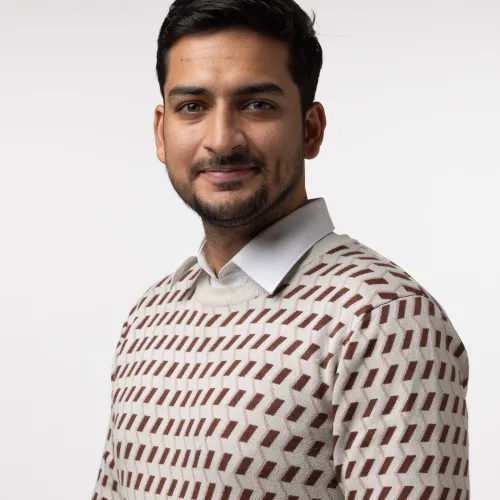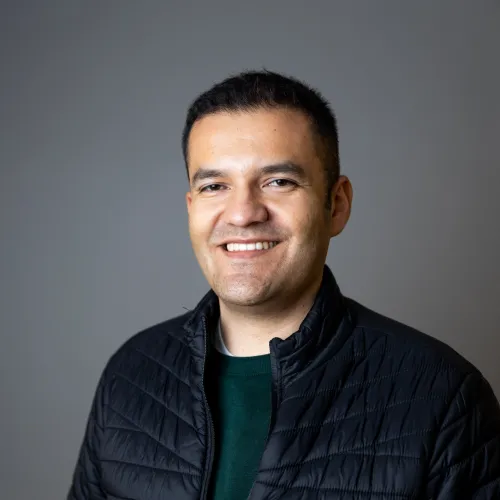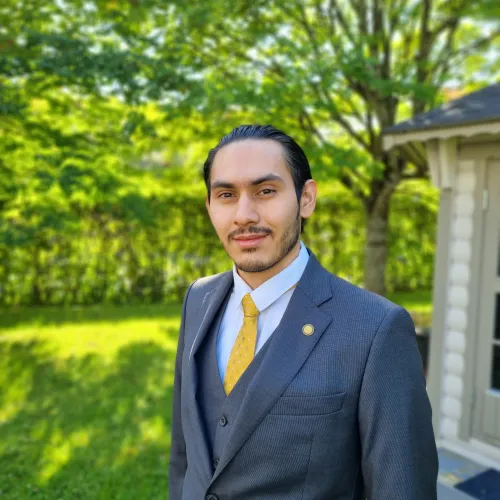Who are you?
Andrea Filippo Di Feo. As a Mechanical Engineer with a strong focus on energy systems, I possess a comprehensive understanding of the principles and applications of mechanical engineering within the energy sector. My expertise encompasses designing, analyzing, and optimizing energy-efficient systems, ensuring sustainability and innovation. Currently, I am also pursuing a PhD in Physics. My work involves exploring the fundamental principles governing the operation and performance of lithium-ion batteries, aiming to enhance their efficiency, capacity, and structural stability.
Tell us briefly about your research
NMC (Nickel Manganese Cobalt) research focuses on developing and optimizing lithium-ion battery cathodes. This work involves investigating the electrochemical properties of NMC materials to enhance battery performance, including energy density, cycle life, and safety.
My research evaluates nickel, manganese, and cobalt interactions to balance the trade-offs between energy density, power density, and structural stability. The goal is to improve the efficiency and longevity of NMC-based batteries, making them more suitable for applications such as electric vehicles and renewable energy storage.
Research can be divided into two main stages: material synthesis and analysis. The first stage will be performed using traditional techniques such as co-precipitation and innovative ones using the Ultrasound-Assisted method. In ultrasound-assisted synthesis, high-frequency sound waves are used to generate cavitation in the precursor solution. Cavitation involves the formation, growth, and implosive collapse of bubbles, creating localized high temperatures and pressures. These extreme conditions facilitate the rapid and uniform mixing of precursor materials, such as nickel, manganese, and cobalt salts, ensuring homogeneous nucleation and growth of the particles.
One of the most important analyses that will be performed is Positron Annihilation Spectroscopy (PAS). PAS is an advanced analytical technique used to study materials' electronic structure and defects. It involves the introduction of positrons, the antimatter counterparts of electrons, into a material. When these positrons encounter electrons within the material, they annihilate each other, emitting gamma photons. The properties of these emitted photons provide detailed information about the material's atomic and electronic structure.
Why did you become interested in SEED?
My interest in lithium-ion battery research originated from their pivotal role in modern technology and sustainable energy solutions. I was intrigued by the challenge of enhancing their performance, longevity, and safety, which offered a chance to contribute to significant technological advancements and environmental sustainability. The SEED program's emphasis on innovative, eco-friendly technologies with an interdisciplinary approach provides an ideal platform for advancing my knowledge and contributing to meaningful projects.
What expectations did you have, and how has it been so far?
I expected to work on innovative approaches to enhance the energy density, safety, and lifespan of lithium-ion batteries. Additionally, I looked forward to collaborating with experts in the field, leveraging advanced research facilities, and contributing to publications and presentations that advance scientific knowledge. The collaborative environment and access to university facilities have been instrumental in advancing my work. I am in the early stage of PhD career, so I've spent considerable time familiarizing myself with the existing literature and setting up initial experiments. In the next months, experimental activities will be performed.
Have you enjoyed Finland?
The best part about Finland is its unique blend of natural beauty, innovative culture, and high quality of life. Finland's life is devoted to emphasizing a strong connection to nature, reflected in their sustainable living practices and environmental consciousness. The Finns' commitment to well-being and equality fosters a sense of community and social trust. Interacting with the Finnish people and experiencing the "sisu" spirit—characterized by resilience and determination—would be inspiring. Overall, Finland's combination of natural wonders, cultural depth, innovative spirit, and unique societal values makes it a fascinating country worthy of curiosity and exploration.

Who are you?
I am Anitta Sha Mercy, from Kerala, India. Currently, I'm pursuing my passion for research as a Junior Researcher in the Department of Separation Science at LUT University, Lappeenranta, Finland under the ”Systems and Engineering Science Doctorate (SEED) programme”. Under the programme, I also have opportunity to do an academic secondment at the University of Trento, Italy and an Intersectoral secondment at Electro Optical Systems, Finland.
My academic foundation lies in a Master of Science degree in Chemistry from the University of Calicut. Prior to joining LUT, I gained valuable research experience working as a researcher at the National Institute of Technology, Calicut, India.
Tell us briefly about your research
My research theme is: Metal recovery by 3D-printed porous structures and their use as catalysts. The research focuses on fabricating novel porous structures incorporating Electrospinning and 3D printing technology for recovering precious metals from waste effluents, including municipal wastewater, and utilising it for green catalytic applications.
My research areas mainly include metal recovery, Electrospinning, 3D printing, polymer nanocomposite fabrication and catalysis.
Why did you become interested in SEED?
I have been interested in research since my childhood and continued my passion even after my Masters. I was consistently looking forward to research positions when I came across the SEED programme and the research theme was aligned with my previous research which made it more interesting. Along with that, the programme received funding from the European Union through Marie Skłodowska-Curie actions. I also understood that the SEED programme will allow the doctoral candidate to work with the LUT University, Finland and the University of Trento, thereby giving them international academic and research exposure. Also, the non-academic secondment at Electro Optical Systems, Finland will help me to work in an industrial environment.
What expectations did you have, and how has it been so far?
The SEED programme , as expected ,was successful in providing international experiences, collaborative opportunities, and fostering new friendships. The SEED Kick – off meeting proved to be a valuable platform. It encouraged interactions among participants and provided insightfull overviews of each others research areas.
The guidance of my supervisor Prof. Eveliina Repo and my second supervisor Prof. Ekaterina Laakso helped me in both academic and non–academic matters. I am looking forward to work with supervisor Paolo Bosetti at the University of Trento.
Have you enjoyed Finland?
Having arrived in Finland just two months ago, I've been fortunate to witness the splendor of both spring and summer seasons.
The best thing about Finland is the nature and fresh air. I was able to experience the beauty of forests and lakes. Additionally, I've been impressed by the Finnish emphasis on achieving a healthy work-life balance.

Anitta Sha Mercy
Who are you?
I am Ayesha Sajjad, a junior researcher currently affiliated with the esteemed Industrial Engineering and Management department at LUT. My role within this academic institution involves engaging in rigorous research activities, contributing to the advancement of knowledge in the field of industrial engineering and management through a variety of scholarly pursuits and collaborations with fellow academics and professionals.
Tell us briefly about your research
My research focuses on working capital management, localization, and low carbon industries. Specifically, I explore strategies to optimize working capital for enhanced financial efficiency, analyze the benefits and challenges of localizing supply chains, and investigate sustainable practices and technologies to support the transition to a low carbon economy.
Why did you become interested in SEED?
I became interested in the SEED program at LUT because of its strong emphasis on sustainable development and innovation. LUT's reputation for cutting-edge research in green technologies and its commitment to fostering industry-academic collaborations perfectly align with my research interests in working capital management, localization, and low carbon industries. The opportunity to engage with leading experts and access state-of-the-art facilities at LUT was a compelling factor in my decision.
What expectations did you have, and how has it been so far?
I initially expected the SEED program to offer a rich blend of academic and industry experiences, particularly through its secondment opportunities. I anticipated gaining deep insights into both university-led research and industry practices. The secondment at the university will provide a rigorous academic environment for theoretical exploration, while the industry placement will offer practical, hands-on experience in applying research to real-world challenges. This dual exposure will bridge the gap between theory and practice in my field. So far, the program has surpassed my expectations.
Have you enjoyed Finland?
Finland's most remarkable attribute lies in the intricate fusion it has achieved between a top-tier educational framework and a robust dedication to the principles of sustainability. The nation's unwavering dedication to pioneering advancements and environmentally friendly technologies serves as a beacon of motivation that seamlessly harmonizes with the objectives I aim to pursue in my academic endeavors. Furthermore, the prevailing ethos of cooperation and transparency deeply embedded within Finnish society has cultivated a remarkably nurturing and stimulating milieu conducive to the cultivation of one's professional trajectory and personal development.
On a personal level, I have thoroughly enjoyed the natural beauty of Finland. The serene landscapes, from its vast forests to its picturesque lakes, offer a perfect retreat and a source of inspiration. The Finnish way of life, with its balance of work and leisure, has also been a highlight. Experiencing local traditions, such as sauna culture, and the warm hospitality of the Finnish people has made my stay truly memorable.

Who are you?
My name is Elizaveta Girshova. I am currently enrolled in the SEED doctoral program. I hold a bachelor's degree in biophysics and a master's degree in cognitive sciences. Motherhood is an important part of my life, primarily because my sons are still young and require a lot of care, and secondly because I understand that my actions set an example for them. I love nature and traveling; the best vacation for me is one spent in the mountains.
Tell us briefly about your research
My research is dedicated to optimizing waste-to-energy technology. I believe this is a highly important applied task because the issue of waste cannot be overstated, and in some parts of the world, the situation is truly alarming. Since this process, without exaggeration, affects everyone, a multidisciplinary approach is necessary, taking into account not only technical aspects but also behavioral ones.
Why did you become interested in SEED?
All my previous experience as a researcher was strictly theoretical. I enjoyed formulating problems and solving them, but as I matured, I developed a desire for something more applied, even if it's just an attempt to improve the world around me.
What expectations did you have, and how has it been so far?
I expect that over the next few years, I will gain truly relevant experience in my chosen field of research, meet people working in this area, and establish collaborations with them. I also hope to acquire new scientific knowledge that will aid other researchers and can be applied in practice.
Have you enjoyed Finland?
It's difficult to answer because I've always liked Finland, primarily for its nature, cinema, and the books of Maiju Lassila. Probably, what pleasantly surprised me the most is the atmosphere at the university, the attitude towards research work, the friendly environment, and the willingness to help. I am very grateful to the university for such a fantastic opportunity.

Who are you?
My name is Grigorii Sadovskii, and I am first year PhD student at LUT’s IEM department. My current supervisors are prof. Ville Ojanen, Dr. Yan Xin and prof. Lea Hannola. My academic journey began with a BSc in Innovation Management and Industrial Engineering from Bauman Moscow State Technical University, followed by an MSc in Management of High-tech Industries, and culminated with a Double Degree MSc from Lappeenranta-Lahti University of Technology (LUT) in Global Management of Innovation and Technology. Building on my academic foundation, my professional experience as a Consultant at the Environmental Health & Safety Management (EHSM) module with SAP SE from 2018 onwards within several companies as a data/system analyst enriched my understanding of sustainable practices in the energy and mining sectors. This role, involving the customization and implementation of EHSM modules for international companies and the development of project tracking tools, underscored the importance of integrating environmental considerations into corporate strategies.
Tell us briefly about your research
My research field resides within the domain of industrial engineering and management, with a specific focus on “MultiModal Business Intelligence for Zero-Waste Manufacturing” and Recycling. This area is paramount as it integrates diverse data sources to optimize manufacturing processes and recycling efforts, aiming to achieve sustainable production and minimize environmental impact (reaching carbon neutrality). I employ a comprehensive approach combining a systematic literature review, expert evaluations in ESG, a case study on Haptronics Oy with Cargotec Oy assistance as industry experts, LCA for end-of-life cycle assessment (will receive consultancy on SMEs for developing proper hypothesises on experts’ evaluations), multi-scale CEP analysis, and data-driven PLM methods to address zero-waste manufacturing and recycling challenges. This multidimensional strategy is chosen over singular quantitative or modelling methods to integrate both qualitative insights and quantitative data for a holistic understanding and innovative solution development.
The main thing is to further develop product-service system (PSS) and new proposals of digital product passport (DPP) in harbour/port settings approaches and data management system with prototyping for the stakeholders in manufacturing systems. For the first paper currently, I am utilizing text mining to see what current state of the Finnish SMEs development are and needs for those sustainable solutions.
Why did you become interested in SEED?
My choice to study at LUT and particularly with SEED setting is to delve into the subject of technological innovation and sustainability in manufacturing was driven by a profound internal motivation to understand and solve complex problems in these fields, especially in the face of the frequent challenges and failures that research entails for European and global entrepreneurship outlooks.
My commitment to pursuing research at LUT, focused on technological innovation and sustainability, was further solidified by this practical exposure, which highlighted the intrinsic value of seeking knowledge to navigate and solve the complex sustainability challenges faced by industries today. The program itself comprises with multiple students with various backgrounds, making it truly unique so all of us can collaborate and make joint projects within LUT’s aims. Also, each program has academic secondment and company secondment is very well made to approbate further ideas (in my case in NUS University, Singapore).
What expectations did you have, and how has it been so far?
I am looking forward to deepening my research within company settings next academic semester (autumn 2024) and to try out my ideas in real business environment and improve existing progress research progress on top of that. Also, speaking with fellow students and sharing my ideas and helping SEED program members/staff is what I am aiming the most.
Have you enjoyed Finland?
I really enjoyed spending time with my peers and colleagues and first SEED gatherings. So far, my experience and guidance from my supervisors in social events were very pleasant. Many events in the Skinnarila area engaging you to calm down but at the same time are enriched with good people and productive activities (sport, outdoor events, food markets, academic networking events etc.). Sauna, late evening drinks with a mesmerizing lake view on Saima area and great conversations – are things that keep you sharp minded and in good mood every time. All those things are what I am very thankful for and grateful having in Finland. Props to my Finnish/international colleagues I am working with, they are people with different backgrounds and academic experiences. Only such things could happen in the LUT. Lastly, my personal small aim is to see other parts of Finland during my free time and travel to new destinations and exploring new horizons and people around.

Who are you?
I’m Hamza Pervez, a mechanical engineer from Pakistan with a specialization in industrial management. I’ve been actively involved in academic research since 2018, and I’m passionate about developing solutions for managing sustainability issues pertinent to industrial activities.
Tell us briefly about your research
My research focuses on sustainable production, digital transformation, and supply chain performance management. I’m particularly interested in creating frameworks, policies, and recommendations that can help industries operate more sustainably and contribute to sustainable development goals. Currently, I am researching on how modern digital technologies under the backdrop of fourth industrial revolution are changing the way organizations manage their operations and supply chains. Moreover, sustainability implications of these technologies from a triple bottom line perspective are also being investigated.
Why did you become interested in SEED?
The SEED program perfectly aligns with my academic background and future research interests due to its interdisciplinary nature and emphasis on developing eco-friendly solutions. It provides a unique opportunity to delve deeper into sustainability issues and make a meaningful impact on the community. A distinctive feature of the SEED program is its academic and intersectoral mobility period abroad, which will broaden my horizons, foster international networks, enhance my practical skills, and open new career vistas.
What expectations did you have, and how has it been so far?
I expected the SEED program to be a challenging yet rewarding journey that would allow me to further my research in sustainability. So far, it has exceeded my expectations, providing me with invaluable experiences and insights into my field of study.
Have you enjoyed Finland?
As I explore Finland, its breathtaking landscapes with vast lakes and lush forests, hold me spellbound. The country’s unwavering dedication to sustainable development and innovation resonates deeply with my own aspirations, making it an ideal canvas for my research endeavors.

Who are you?
My name is Khashayar Yaghoubi, and I’m a Doctoral Researcher in Chemical Engineering at LUT University, Finland. I hold a Master’s degree in Chemical Engineering – Design of Separation Processes from the University of Tehran, Iran. My research is focused on sustainable energy technologies, particularly the conversion of carbon dioxide and carbon monoxide into valuable fuels using Power-to-X processes.
I’ve always been deeply motivated by the global urgency to combat climate change through practical scientific solutions. As a researcher, I’m especially drawn to challenges that combine chemical engineering and environmental impact. My work requires both hands-on experimentation and advanced modeling: I conduct experimental work in the laboratory, including catalyst testing and reaction performance evaluation, alongside using process simulation and modelling to support process development. In the next stages of my research, I will also be synthesizing novel catalyst formulations, aiming to improve activity and selectivity toward desired fuel products. This combination of experimental and computational work gives me a comprehensive perspective on how to optimize these processes both in theory and in practice.
I'm deeply committed to accelerating the transition toward a carbon-neutral future and believe that science and innovation must play a key role in shaping a cleaner, more sustainable world. Through my work, I hope to contribute to practical solutions for global energy and climate challenges.
Tell us briefly about your research
My doctoral research focuses on CO₂-based and CO-based Fischer-Tropsch Synthesis (CO₂-FTS and CO-FTS), processes that convert CO₂/H₂ or CO/H₂ mixtures into valuable liquid hydrocarbons. The aim is to enable a viable pathway toward carbon-neutral fuels by developing catalysts and process conditions that enhance selectivity and energy efficiency. My work involves three main components:
Lab experiments, where I test various catalysts and carry out many experiments under controlled operating conditions.
Process simulation, where I model the reactor system to predict product distributions and optimize parameters.
Catalyst development, which includes planning and performing synthesis of new catalyst formulations based on the insights gained from both experimental and simulated results.
The interdisciplinary nature of this research—linking chemical engineering and sustainability—is what makes it both challenging and exciting.
I’m truly proud and grateful to be taking even a small step toward saving and protecting our planet.
Why did you become interested in SEED?
I was drawn to SEED because of its unique structure that combines academic excellence, industry collaboration, and entrepreneurship. The program doesn’t only focus on producing good research, it also emphasizes real-world application and societal relevance, which deeply resonates with my values as a researcher.
One of the strongest motivations for joining SEED was the opportunity to engage in secondments. As part of the program, I will be working both in academia and industry through secondments at Nanyang Technological University (NTU) in Singapore and Xylo Gas, a technology company in Finland. These experiences will allow me to broaden my technical skills, gain global perspectives, and build bridges between fundamental research and industrial implementation. This kind of cross-sector experience is rare in traditional PhD programs and was a key factor in choosing SEED.
What expectations did you have, and how has it been so far?
My expectations for SEED were high. I was looking for a program that challenges me scientifically, connects me with industry, and helps me grow professionally. So far, the experience has been incredibly rewarding. I’ve received excellent mentorship, access to world-class lab facilities like the new P2X Lab at LUT, and the chance to collaborate across disciplines. SEED also encourages independent thinking and proactive learning, which has helped me become more confident in both research and communication.
Have you enjoyed Finland?
Absolutely. Finland has provided a peaceful, focused, and supportive environment that’s ideal for research. I particularly enjoy the winters, the calmness of nature, and the strong culture of work-life balance. These elements have helped me stay grounded and motivated during the more intense phases of work and writing. I also appreciate how open and collaborative the research community is here, it truly feels like a place where ideas can grow. Finland also offers a unique combination of tranquility, safety, and a deep respect for nature. I truly appreciate how clean the air and water are here, and I admire how seriously environmental protection is taken in Finnish society. One of the most special experiences for me has been ice swimming—something I never imagined I would enjoy so much, but now I absolutely love it! It’s a wonderful place to live, reflect, and grow.

Khashayar Yaghoubi
Who are you?
I'm Leonardo Triana, currently a Junior Researcher at LUT University. I have a background in research, development, and innovation, which I've been cultivating for several years. Before this role, I led innovation projects at Politécnico Grancolombiano, working closely with various stakeholders to execute successful research and development initiatives.
Tell us briefly about your research
My research focuses on creating an integrative framework to enhance urban air quality through socio-digital innovations. The project combines social innovation, knowledge networks, and practical air quality improvement projects. The goal is to develop sustainable solutions by leveraging digital technologies and fostering community engagement to tackle air pollution in urban environments.
Why did you become interested in SEED?
The SEED program appealed to me because it emphasizes interdisciplinary research and practical applications, particularly in sustainable development and engineering. The program's focus on creating real-world solutions to pressing environmental challenges aligns perfectly with my interests and professional goals. Additionally, the opportunity to collaborate with leading experts and institutions like LUT University, Ramboll Oy and Politecnico di Milano was a significant draw.
What expectations did you have, and how has it been so far?
I expected the SEED program to provide a stimulating and collaborative environment for cutting-edge research and innovation. It has been incredibly rewarding and has exceeded my expectations. The interdisciplinary approach and support from my supervisors and peers have been outstanding. I am especially grateful to my supervisor, Helinä Melkas, for her attentiveness, kindness, and invaluable support.
Have you enjoyed Finland?
The best part about Finland has been the perfect balance between work and life. The country's commitment to sustainability and innovation creates an inspiring environment for my research. Additionally, the natural beauty of Finland is breathtaking, and I've enjoyed exploring the outdoors. The Finnish culture of collaboration and community has also made it easy to integrate and feel at home here.

Leonardo Triana Cuesta
Who are you?
I am Sergio Mauricio Vanegas Arias, a Mathematical Engineer and AI researcher passionate about Programming, Music, and Digital Signal Processing.
Tell us briefly about your research
My research aims to utilise cutting-edge ML technologies and paradigms to optimise and automate the dispatch of renewable energy resources in industrial settings, ensuring reliable operation and preventing profit loss from service interruptions.
Why did you become interested in SEED?
At my previous job a similar, smaller-scoped project was being discussed but ended up being cancelled due to budget and time constraints. When I saw the application details for the SEED call, I decided to expand the goals of the proposal mentioned above and develop it at LUT.
What expectations did you have, and how has it been so far?
I was told by several colleagues that I should expect my first PhD year to comprise almost exclusively literature review and getting the required course credits. However, my advisors encouraged me to take a more practical approach, which allowed me (amongst other things) to participate in a Workshop as a presenter last Spring and complete my first term of the company secondment.
Have you enjoyed Finland?
The Nature and the Work Culture. Coming from Colombia, this was the first time I got to experience real winter in an urban environment, and I loved every day of it. As for the job environment, the straightforward nature of official communication along with the clear separation between job and personal life has allowed me to develop my professional career without neglecting my well-being.

Sergio Vanegas Arias
Who are you?
My name is Sreman Chandio. I hold a master's degree in IT Management from Umeå University in Sweden and a bachelor's degree in software engineering from NUST University in Pakistan. Currently, I am pursuing a PhD in Software Engineering at LUT University, Lahti campus.
Tell us briefly about your research
My research is related to Civic tech, especially grassroots civic tech, a new form of community-led engagement. The civic tech ecosystem depends on multiple contributing entities to co-create and deliver the desired result. The problem arises as these group's software development and data management practices are seldom interlinked, which limits their effectiveness. To remedy this, I am currently looking at AI assistance tools for software development and how they can help with civic tech projects.
Why did you become interested in SEED?
I became interested in the SEED doctoral program because of its well-structured plan, which includes an academic secondment in a high-standing university and a non-academic secondment in Finland's industry. The research topic also got me even more interested in SEED, as I had the freedom to develop my research plan around civic tech.
What expectations did you have, and how has it been so far?
When I joined the SEED doctoral program, I anticipated a robust academic experience and practical industry exposure. So far, the program has exceeded my expectations in terms of academic experience. Further, my colleagues and supervisors at LUT University are incredibly supportive and provide valuable guidance and feedback. Overall, the program has been enriching so far.
Have you enjoyed Finland?
The best part about Finland has been its harmonious blend of nature and urban life. Strolling through the vibrant city of Lahti, you're never far from serene lakes and lush forests. The fresh waters are perfect for learning to swim, which I am trying to accomplish this summer. This unique mix offers a refreshing and balanced lifestyle, and I have immensely enjoyed it so far.

